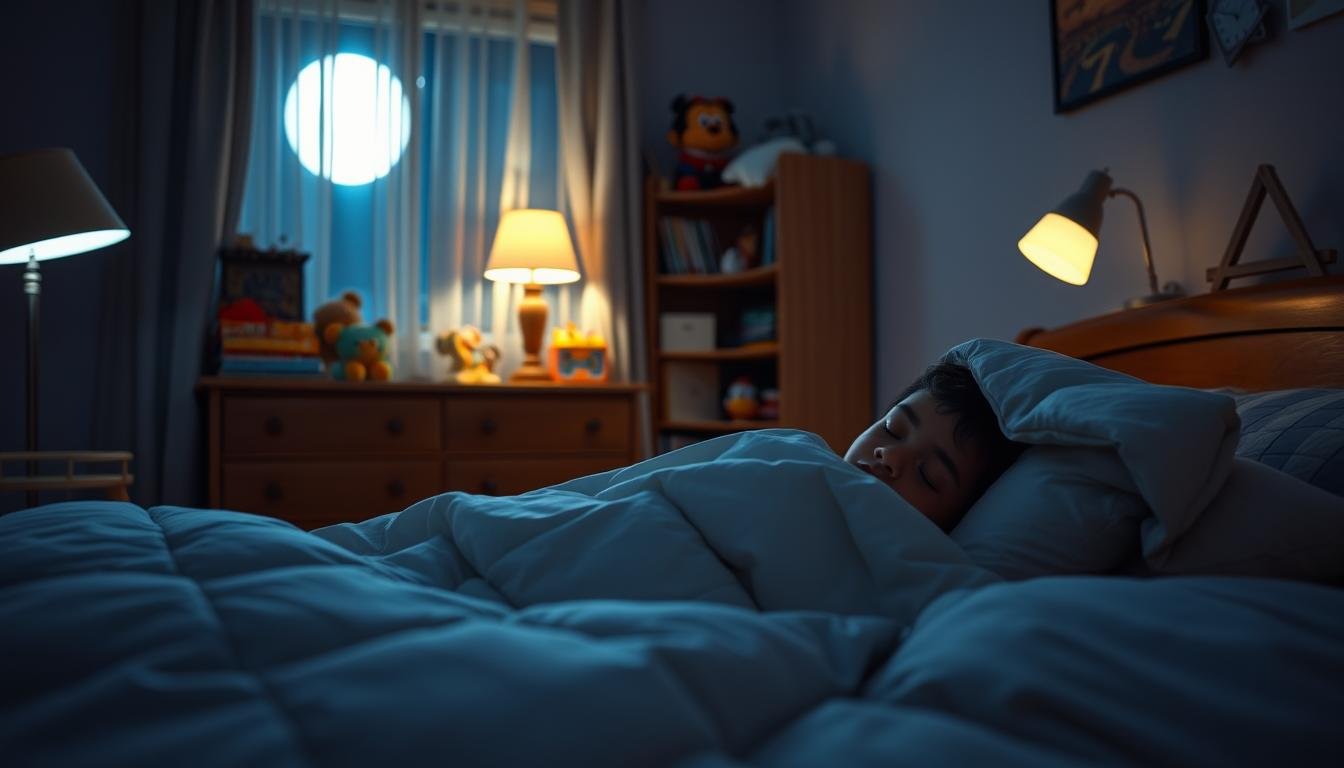Sleep is very important in our lives, more so for our kids during school. Is your child’s sleeping routine for school helping them do their best? Setting up a routine that works can be tough. It’s about making bedtime habits that calm and strengthen them for the next day.
A good night’s sleep is key for a child to reach their full potential. As we look into setting up a sleep schedule, we will cover ways to help their learning and overall health. It’s more than just setting bedtimes. It’s about building habits that help them lifelong, making school mornings smooth.
Understanding the Importance of Sleep for School Success
We often talk about eating right and staying active for kids. But what about good sleep? The National Center for Biotechnology Information links good sleep with better grades. Actually, getting enough sleep is key to learning well and remembering more.
Sleep isn’t just a break for kids, it’s crucial. It helps make memories stick and gets the brain ready to learn new things. At night, deep sleep stages are essential for turning what kids learn into lasting knowledge.
Not getting enough sleep hurts a child’s ability to stay alert and pay attention in school. They struggle to keep up and join in. The American Academy of Sleep Medicine has even set sleep time rules to help kids do their best in school and with friends.
As we look at ways to improve sleep routines for kids, remember how vital sleep is. Not just for school success, but for overall happiness. Let’s make sure our kids get enough sleep. It’s a key part of doing well in school and growing up healthy.
Establishing a Consistent Sleep Schedule
As summer ends and school time comes closer, it’s essential to help your kids adjust their sleep schedules. This shift from a summer to a school routine can be tough. That’s why making slow changes to the schedule is very important.
Start by setting a regular bedtime two to three weeks before school begins. Make bedtime 15 minutes earlier every few days. This slow change helps their body adjust smoothly. Keep the same bedtime on weekends too. This avoids messing up their new schedule.
Waking up at the same time each day is as important as going to bed on time. Keep your child’s wake-up time close to what it will be for school, even on days off. Doing this will help set their body’s clock. It makes getting up early for school easier when it starts.
Following these steps not only helps your child get on a good school sleep schedule. It also builds habits for good health for life. A regular bedtime routine and our advice on changing the schedule little by little. This will make sure your child starts the new school year full of energy and ready to learn.
Creating a Bedtime Routine That Works
Creating a bedtime routine for kids is key for them to sleep well and be ready for tomorrow. A good bedtime ritual includes activities that calm kids down and help them sleep easier.
A good stress-free bedtime often starts with a warm bath. Then, changing into cozy pajamas, and doing a quiet activity like reading. It’s essential to keep this routine the same every night. This helps your child know when it’s time to sleep.
Here’s a bedtime routine you might try:
- A warm bath helps relax muscles and shows bedtime is near.
- Brushing teeth also shows the day is ending.
- Getting into pajamas tells the body it’s time to sleep.
- Reading a story or talking quietly helps calm down before sleep.
To make bedtime even smoother, turn off all screens an hour before bed. This is because screens can stop melatonin, which we need for sleep, from being made. This can make falling asleep harder for kids.
Remember, the goal is to make bedtime something your child looks forward to. By being patient and keeping a consistent bedtime routine, you’ll see your child fall asleep easier and sleep better.
Improving Sleep Environment for Better Rest
We know how important a good sleep space is for your child’s health. Making their sleep surroundings better can help them have more peaceful nights. This is very important for their performance in school and their overall well-being. Here’s how to make your child’s room better for sleeping.
- Keep the Bedroom Dark: Use blackout curtains or heavy drapes to block street lights and early morning sun. This helps prevent sleep disruption.
- Maintain a Cool Temperature: Keeping the room cool, ideally between 65-70 degrees Fahrenheit, encourages the body to sleep.
- Minimize Noise: A white noise machine or fan can cover up disturbing sounds. This creates a steady sound background that’s good for sleeping.
- Optimize Bedding: Buying comfy, hypoallergenic mattresses and pillows is key. Make sure the bed is just for sleeping. This strengthens the link between bed and sleep.

Limited screen time before bed is also crucial for better sleep hygiene. It helps the body make melatonin, a sleep-regulating hormone. Making even small changes to where your child sleeps can greatly improve their rest and health overall.
The Role of Diet and Exercise in Promoting Quality Sleep
Exercise and sleep greatly affect our kids’ health. Regular exercise boosts sleep quality and lowers stress. These benefits are key for your child’s growth. But, it’s important not to exercise right before bedtime. This avoids getting them too excited to sleep. The food they eat is just as important in ensuring they sleep well.
Eating the right foods is key for good sleep. Especially, avoiding stimulants like caffeine is crucial. Caffeine can mess up your child’s sleep patterns. Thus, skip caffeine in the afternoon and at night. Make sure your child eats well and at the right times, especially before bedtime.
- Maintain a balanced diet rich in fruits, vegetables, and whole grains to stabilize energy levels throughout the day.
- Encourage physical activity during the day; ideal timing is after school, allowing a wind-down period before bedtime.
- Avoid foods and drinks high in caffeine, such as certain sodas, coffee, and even some teas, particularly in the evening.
Exercise and eating right are key to both physical and mental health. They help improve sleep. By managing these well, we support our kids to not only sleep well but also live well.
Managing Screen Time Before Bed
In today’s world, managing screen time before bed is key for kids’ healthy sleep. Blue light exposure from electronic devices can mess up their natural sleep pattern. This makes it tough for them to fall asleep and stay asleep.
Electronic devices are a big part of our lives now. However, setting screen time limits is crucial for our kids’ sleep quality. We’ll share some tips to reduce blue light exposure and help your children smoothly transition to sleep:
- Establish a “device-free” zone in the bedroom to keep electronic gadgets out of reach during bedtime hours.
- Encourage activities that don’t involve screens, like reading a book or journaling, at least an hour before bed.
- Consider using blue light filters on devices that are used close to bedtime to mitigate some of the impacts of blue light on sleep.
By trying these strategies, you can improve how fast your child falls asleep and their sleep quality. Promoting screen time limitations not only cuts down on blue light exposure. It also helps their overall health and wellbeing, leading to better sleep patterns for life.
Addressing Common Sleep Challenges
Every parent knows how tough it is when children fight sleep, especially when trying to change their sleep schedules. This often leads to trouble falling asleep or waking up a lot at night. A slow approach can help with resetting a child’s internal clock, improve sleep patterns, and reduce waking up during the night.
It’s critical to manage when kids nap, particularly for older children. Naps are good for young kids but can affect night sleep if they nap too late. Adjusting nap times slowly is key, making sure naps don’t mess with their sleep at night.
Changes in daily routines can lead to children resisting bedtime. Knowing how to handle this can make a big difference. Having a steady bedtime routine matters because sudden or slow changes can affect how well a child sleeps. Sleep experts say keeping bedtime routines consistent is crucial for managing sleep cycles.
Here’s a simple guide to what may be impacting your child’s sleep and ways you, as a parent, can address it:
| Challenge | Impact on Sleep | Potential Solution |
|---|---|---|
| Sleep Resistance | Difficulty initiating sleep | Create a calm bedtime routine |
| Irregular Napping | Over-tiredness, impairing night sleep | Regularize nap times |
| Adjusting Sleep-Wake Cycles | Awakening at night or too early in the morning | Gradually adjust bedtime and waking time |
Dealing with sleep problems can be stressful, but understanding and the right steps can lead to better sleep for your child. It’s important to be patient and understanding while they adjust to new sleep routines.
Supporting Kids with Special Needs in Establishing a Sleep Routine
Getting special needs children into a good sleep routine takes understanding and adjusting. Children with ADHD and sleep issues often need sleep strategies made just for them.

A steady bedtime routine is very important for many special needs kids. Setting a constant bedtime and wake-up time, even on weekends, helps their internal clock. Adjusting nighttime activities to suit each child’s likes and needs helps them drift off to sleep.
For kids who get easily overwhelmed, it’s good to keep things quiet and dim before bed. This helps them relax.
- A wind-down routine without screens can signal it’s time for sleep.
- Visual aids and rewards can help kids stick to their routine.
For some kids, physical activity is key to good sleep. But, it’s important not to exercise too close to bedtime. Doing vigorous activities hours before sleep gives their body time to relax.
Parents might also talk to healthcare experts to create sleep plans for issues like ADHD. These special plans often improve sleep quality and their overall well-being.
- Little changes in daily habits can make a big difference in sleep quality.
- Talking to a specialist about sleep troubles can reveal underlying issues.
Getting advice from experts is crucial for setting up sleep routines for kids with special needs. By using these personal sleep strategies, we help our kids not just sleep better but live better.
Encouraging Independence in Older Children and Teenagers
Teaching teenagers to take charge of their sleep habits is important. When they understand how good sleep affects focus, stress, and health, they start to value rest more. The key is to connect their sleep to feeling better and doing well.
Letting teens choose when to wake up helps them learn independence. We can guide them in picking alarms and urge them to keep the same schedule daily. This habit teaches them consistency and prepares them for future responsibilities.
Talking about the benefits of sleep is another step in this process. We explain that regular sleep reduces stress and enhances focus. Sharing tips like cutting back on caffeine and creating a bedtime routine also helps them see the full picture of healthy sleeping.
To wrap up, highlighting the value of managing their own sleep schedule makes teenagers more responsible. This approach not only improves their sleep but also equips them for life’s challenges. It’s about equipping them with the skills for success, beginning with quality sleep.
The Benefits of Naps for Young Children
Daytime naps and napping and development are very important but often overlooked. They help regulate the sleep cycle of young children. This rest during the day helps them grow mentally and physically. By encouraging good nap habits, we help them reach important growth steps.
Naps can really make a difference in how young children grow and learn. They can be more alert and ready to learn. Having a regular nap time as part of daily routines can also make them happier and smarter. Let’s look at some facts about the benefits of napping:
| Aspect of Development | Improvement Percentage | Source |
|---|---|---|
| Lowered Anxiety | 40% | Kids Miracle Steps |
| Boost in Independent Skills | 30% | Kids Miracle Steps |
| Improved Language Abilities | 60% | Kids Miracle Steps |
Making sure daytime naps are a normal part of the day is really important. It helps with sleep cycle regulation and napping and development. By letting kids nap when they naturally feel tired and making sure it doesn’t affect their night sleep, we help them sleep better at night and grow up healthy.
How to Adjust Your Kid’s Sleeping Routine for School
As the start of school draws near, it’s crucial to get your child’s sleep on track. A few weeks before school begins, start adjusting their sleep schedule. This will lead to easier mornings and help them focus better in class. Here’s how you can change your child’s sleep routine easily.
Start by moving their bedtime up by 10 to 15 minutes each night. This small shift helps them adjust without shaking up their whole routine. Keep up with the new bedtime every day, including weekends, to make this a solid habit.
Limiting evening screen time can also improve sleep quality and make falling asleep easier. Make sure their room is set up for good sleep, too. It should be dark, cool, and quiet. These steps are all important for a smooth change in their sleep schedule.
Last of all, talk to your child about why good sleep is important. Explain how it helps them at school and keeps them healthy. When they’re part of the plan, changing their sleep habits becomes something positive. They’ll be more excited about getting ready for school.
Conclusion
Starting to work on your kids’ sleep routines might seem hard, but it’s worth it for their health and school success. Good sleep is key for their grades and keeping them happy and healthy. We’ve looked at ways to make bedtime better. From having a regular bedtime to solving sleep problems, each step helps lead to restful nights and happy days.
Sleep habits change as kids get older, so you might need to adjust your plans sometimes. Issues like snoring or bedwetting can come up, but there are always ways to handle them. A study shows a strong link between sleep and school performance. This shows how important it is to focus on sleep.
At Kids Miracle Steps, we understand you might want help along the way. You’re not on this journey alone. Our community is here to support and encourage you. With our help and support, you can look forward to peaceful nights and successful school days for your kids. Let’s work together to build a future of good sleep habits for them.






